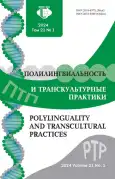От лингводидактики к лингвистике. Возвратные глаголы: лингвистические выводы и лингводидактические рекомендации
- Авторы: Крашевская Н.В.1
-
Учреждения:
- Московский государственный университет геодезии и картографии (МИИГАиК)
- Выпуск: Том 21, № 1 (2024)
- Страницы: 72-82
- Раздел: Билингвальное образование
- URL: https://journal-vniispk.ru/2618-897X/article/view/326946
- DOI: https://doi.org/10.22363/2618-897X-2024-21-1-72-82
- EDN: https://elibrary.ru/YQNODO
- ID: 326946
Цитировать
Полный текст
Аннотация
Данная работа завершает первую серию статей, которые призваны продемонстрировать, как в процессе преподавания языка выявляются нестандартные характеристики языковых явлений, которые в процессе отвлечённых научных изысканий остаются незамеченными. В данной серии речь идет о возвратных глаголах, о предназначении постфикса - - ся и о работе с феноменом залога в процессе преподавания РКИ. Обобщаются выводы по теме и даются рекомендации, каким образом феномен «возвратности» может быть достаточно просто представлен иностранной аудитории при обучении русскому языку. Указывается, что с лингвистической точки зрения главная и важнейшая функция постфикса - ся - это регулирование взаимоотношений субъекта и объекта в создании виртуального события в соответствии с замыслом говорящего. И таким образом, залог - это не столько глагольная категория, сколько синтаксическая. В плане преподавания предлагается использовать континуальную шкалу с крайними точками «100 % актив - 100 % пассив» с опорой на идею «самостоятельности» субъекта предложения. Предлагается использовать понятие «замкнутая система», заимствованное из физики. На шкале выделяются три зоны: несомненный актив - «переходная зона» - несомненный пассив. Это делает явление возвратности простым и понятным и снимает ряд трудностей в использовании различных форм дополнительных актантов в предложении.
Ключевые слова
Об авторах
Наталия Валентиновна Крашевская
Московский государственный университет геодезии и картографии (МИИГАиК)
Автор, ответственный за переписку.
Email: breshka2@gmail.com
ORCID iD: 0009-0009-6016-5740
SPIN-код: 1968-3148
кандидат филологических наук, доцент кафедры лингвистики
Российская Федерация, 105064, Москва, Гороховский переулок, 4Список литературы
- Krashevskaya, N.V., and A.A. Basmanova. 2021. From linguodidactics to linguistics: paradoxes of reciprocal verbs in the Russian language. Modern pedagogical education. Scientific journal, no. 6, pp. 121–126. https://doi.org/10.24412/2587-8328-2021-6-121-126
- Krashevskaya, N.V., and A.A. Basmanova. 2022. From linguodidactics to linguistics: the scale of “degree of independence” as a way to eliminate and explain the paradoxes of recurrent glares in the Russian language. Modern pedagogical education, no. 1, pp. 236–242. https://doi.org/10.24412/2587-8328-2022-1-236-242
- Mel’nikov, G.P. 2003. The system typology of languages. Principles, methods, models. Moscow: Nauka, 308 p.
- Vyazovskaya, V.V. 2017. Reflexive verbs in the practice of teaching Russian as a foreign language. Philological Sciences. Questions of theory and practice, no. 7, part 1, pp. 183–185.
- Mel’nikov, V.I. The theory of a closed system. Monograph. 4th edition. Available from: http://www.vixri.ru/d/Melnikov%20V.I.%20_Teorija%20zamknutoj%20sistemy.pdf (date of application 09.01.2024).
- Lutin, S.A. 2008. System-functional analysis of the category of case in the Russian language: Diss.. doct. Philol. Sciences. Moscow: Peoples’ Friendship University of Russia. 484 p.
Дополнительные файлы









